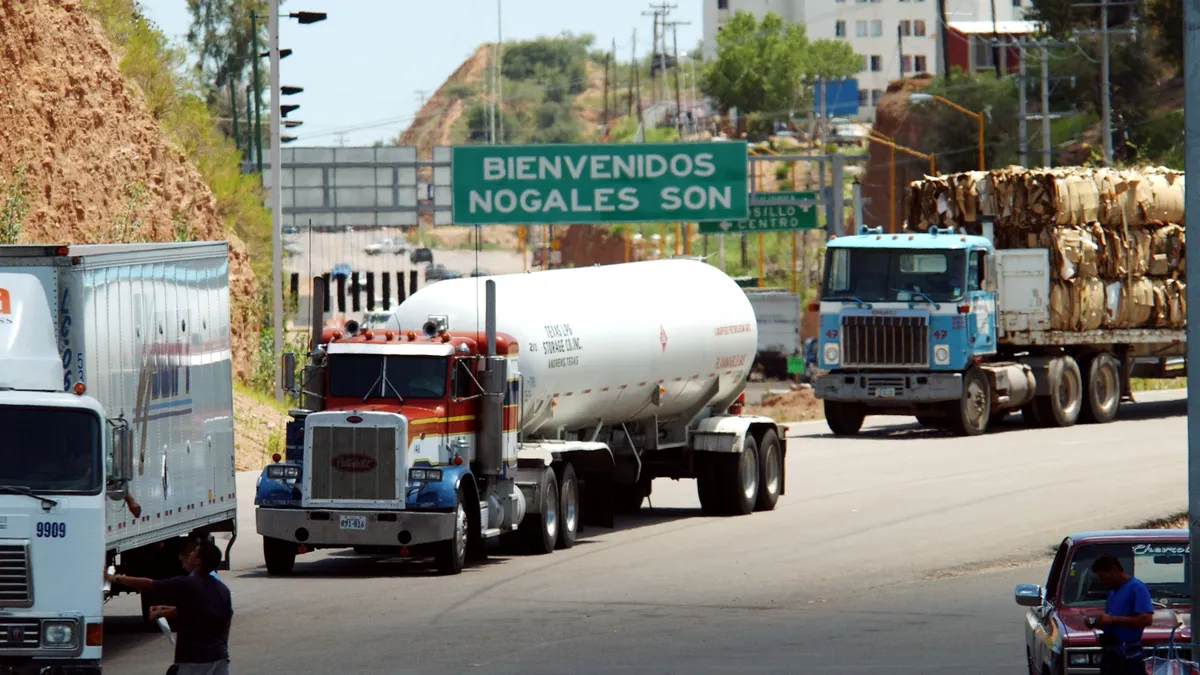Logistics companies are ramping up operations in Mexico to take advantage of an expected surge of businesses nearshoring production to south of the U.S. border.
Chicago-based Redwood Logistics announced last month that it would expand operations in Mexico, noting major investments in the country from the automotive, pharmaceutical and food and beverage industry. Meanwhile, BlueGrace Logistics is establishing a dedicated Mexico office, bringing on a new leader to oversee the expansion of its cross-border services.
As more businesses look to shorten lead times and diversify their supply chains away from China, many shippers are turning to Mexico given its location and trade relationship with the United States.
“The savings you get from manufacturing in Asia are offset if your containers sit on ships for hundreds of days, you rack up huge demurrage fees and chassis are unavailable at the destination port," Jordan Dewart, president of Redwood Mexico, said in a statement. "With Mexico, you simply put what you need on a truck and can have it at a final-mile distribution warehouse within days, rather than months.”
Meeting shipper’s needs
Redwood Logistics is expanding its service offerings in Mexico after demand for services modestly increased, Dewart said in a email to Supply Chain Dive. Industries seeking for Q1 increases include automotive, food and beverage and HVAC manufacturing.
"In the longer term there will undoubtedly be an increase in demand for cross border services,” Dewart said.
For BlueGrace Logistics, expansion into Mexico was a customer-led initiative, and the company will provide customer brokerage in addition to dry van and temp control truckload services. It will also offer cross docking and warehousing services, said Scott Schara, chief commercial officer and president of 3PL services at BlueGrace Logistics.
Schara added that third-party logistics providers are uniquely positioned to take advantage of growth in cross-border freight, noting they have "the engineering processes and technology" to transport cargo cost-effectively.
"Shippers understand logistics strategies tied to nearshoring can help improve the life cycles of their supply chains by promoting tighter turnarounds," he said.
Why Mexico?
Shippers who over-relied on sourcing from Asia found themselves dealing with shortages, congestion and other disruption after COVID-19 shut down manufacturing operations in several countries. The Biden administration has also moved to add more incentives for businesses to move supply chains close to the United States and away from China.
In addition to its geographical location, Mexico has a stable free trade agreement with the United States-Mexico-Canada Agreement, easy travel for on-site access and stronger protection of intellectual property rights in Mexico vs. China, according to Dewart.
“We believe companies will continue to look to Mexico as a long term strategy in order to minimize risks of doing business with Asia (supply chain disruptions, trade disputes, long lead times etc),” Dewart said.
Other major carriers and logistics providers have also ramped up their presence in Mexico to capitalize on the expected nearshoring trend.
Ryder System said nearshoring activity has been increasing in Mexico, largely from automotive and industrial verticals that the company serves. Ryder has had a presence in Mexico for three decades, and revenue for its supply chain solutions segment has increased even as customer accounts dropped during that time.
Ryder’s Mexico business grows even with fewer customers
“With its ability to leverage demonstrated operational expertise, customer relationships and nearshoring trends, we're excited about the long-term growth opportunities available to Ryder México,” said Ryder CEO Robert Sanchez on an April 26 earnings call.
Rail carriers have also moved to compete for customers in Mexico. Newly-formed Canadian Pacific Kansas City is set to compete for intermodal customers as Union Pacific, Canadian National and Ferromex owner Grupo México Transportes announced plans for their own cross-border service called Falcon Premium.
Mexico’s central bank reported in July 2022 that 16% of surveyed companies said they had benefited from a demand increase over the previous 12 months, which they could tie in one way or another to nearshoring.
“Nearshoring in Mexico is a strategy that supply chain decision-makers are increasingly pursuing to reduce the risk and increase the resiliency of their supply chains,” Sanchez said.
Transport Dive Associate Editor David Taube contributed to this report.















